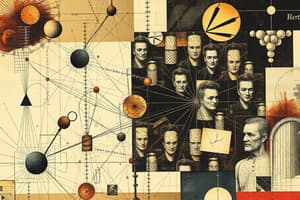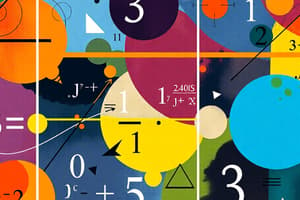Podcast
Questions and Answers
Which branch of mathematics primarily deals with shapes, sizes, and positions of objects in space?
Which branch of mathematics primarily deals with shapes, sizes, and positions of objects in space?
- Statistics
- Calculus
- Algebra
- Geometry (correct)
What is the main purpose of algebra in mathematics?
What is the main purpose of algebra in mathematics?
- To represent relationships using symbols and variables (correct)
- To solve problems involving angles
- To understand the properties of numbers
- To analyze numerical data
Which of the following fields studies the properties of numbers, including primes and divisibility?
Which of the following fields studies the properties of numbers, including primes and divisibility?
- Discrete Mathematics
- Number Theory (correct)
- Trigonometry
- Linear Algebra
What is a fundamental operation that involves finding the difference between two quantities?
What is a fundamental operation that involves finding the difference between two quantities?
Which branch of mathematics focuses on continuous change and includes concepts like derivatives and integrals?
Which branch of mathematics focuses on continuous change and includes concepts like derivatives and integrals?
In mathematics, what do we call the relationships between variables where an output corresponds to an input?
In mathematics, what do we call the relationships between variables where an output corresponds to an input?
What type of mathematics is necessary for solving systems of linear equations?
What type of mathematics is necessary for solving systems of linear equations?
Which of the following best describes logarithms in mathematics?
Which of the following best describes logarithms in mathematics?
Flashcards
Arithmetic
Arithmetic
A set of rules for combining numbers and symbols to solve problems. Basic operations include addition, subtraction, multiplication, and division.
Algebra
Algebra
A branch of math that uses letters (variables) to represent numbers and solve equations.
Geometry
Geometry
The study of shapes, sizes, positions, and relationships of objects in space. It involves concepts like points, lines, angles, and surfaces.
Calculus
Calculus
Signup and view all the flashcards
Statistics
Statistics
Signup and view all the flashcards
Trigonometry
Trigonometry
Signup and view all the flashcards
Number Theory
Number Theory
Signup and view all the flashcards
Discrete Mathematics
Discrete Mathematics
Signup and view all the flashcards
Study Notes
Branches of Mathematics
- Arithmetic: Deals with basic operations like addition, subtraction, multiplication, and division. Forms the foundation for more advanced mathematical concepts.
- Algebra: Uses symbols and variables to represent numbers and relationships. Generalizes arithmetic principles and solves equations.
- Geometry: Focuses on shapes, sizes, and positions in space. Uses points, lines, angles, and surfaces.
- Calculus: Deals with continuous change, rates of change, and accumulation. Includes differential and integral calculus.
- Statistics: Collects, organizes, analyzes, interprets, and presents numerical data.
- Trigonometry: Relates angles and sides of triangles, crucial for right-angled triangles and angle/distance problems.
- Number Theory: Studies properties of numbers (prime numbers, integers), divisibility, and factorization.
- Discrete Mathematics: Focuses on objects and sets with distinct values, useful in computer science.
- Linear Algebra: Studies vectors, matrices, their properties, systems of linear equations, and data transformations.
Basic Mathematical Concepts
- Sets: Collections of objects; fundamental for grouping and classifying elements.
- Functions: Relationships where an output corresponds to an input; crucial for modeling real-world phenomena.
- Variables: Symbols representing unknowns or changeable quantities; essential for algebraic expressions.
- Equations: Mathematical statements where both sides are equal; used to solve for unknowns.
- Inequalities: Relationships between expressions that aren't equal; represent conditions or ranges of values.
- Logarithms: Inverse of exponentiation; simplifying calculations with very large or small numbers.
Fundamental Operations
- Addition: Combining two or more quantities.
- Subtraction: Finding the difference between two quantities.
- Multiplication: Repeated addition of a quantity.
- Division: Breaking down a quantity into equal parts.
Common Mathematical Symbols
- "+" (addition)
- "-" (subtraction)
- "×" or "*" (multiplication)
- "/" (division)
- "=" (equality)
- "≠" (inequality)
- ">" (greater than)
- "<" (less than)
- "≥" (greater than or equal to)
- "≤" (less than or equal to)
Studying That Suits You
Use AI to generate personalized quizzes and flashcards to suit your learning preferences.




